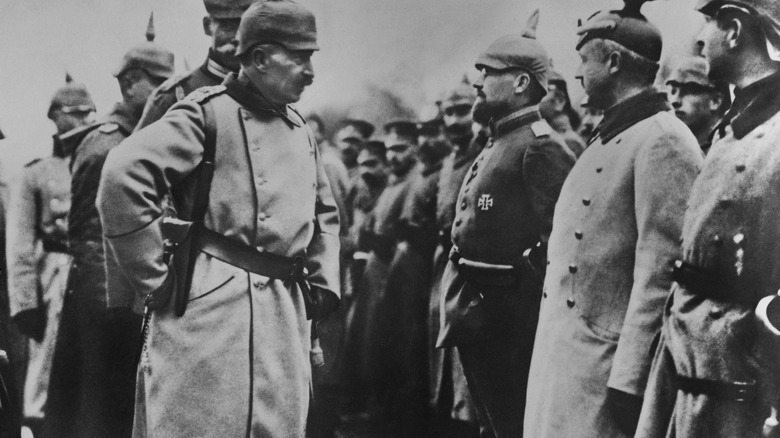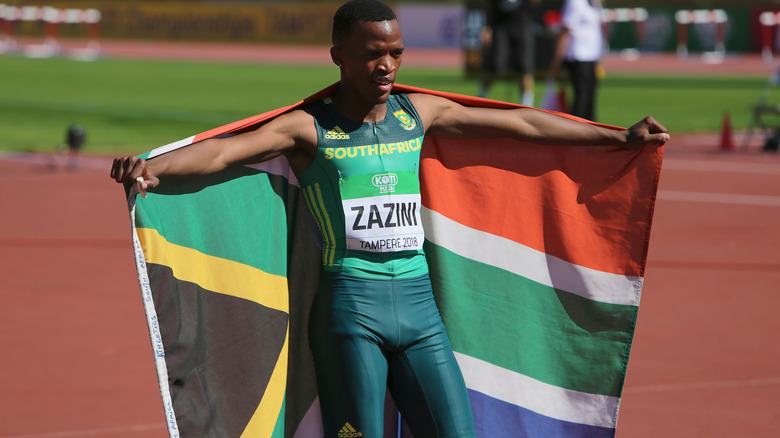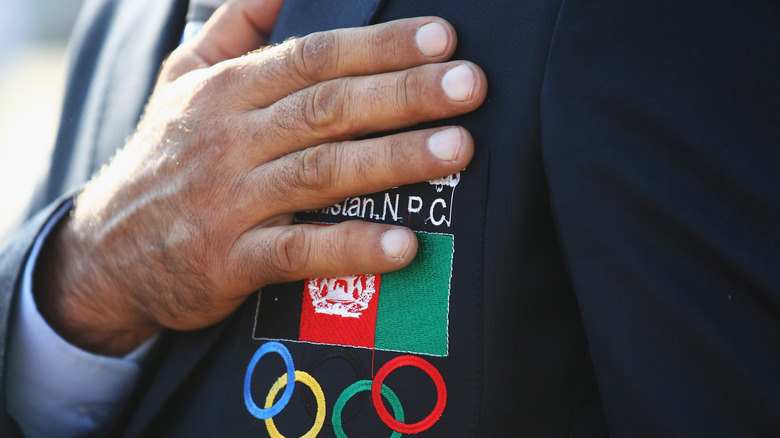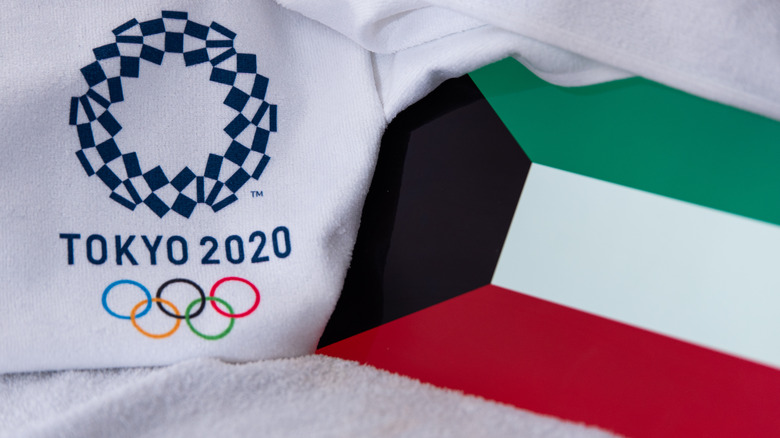All The Times Countries Have Been Banned From The Olympics
Being part of the Olympic games is truly an honor. Not just from an athlete's perspective, though these competitors are the cream of each country's proverbial crop, but an honor as a nation. Since the first spark lit the Olympic flame of the modern incarnation of the games, countries from all around the globe have carried the organization's torch — physically, which is quite the feat of its own, but they also carried a metaphorical fire that symbolizes all the different peoples of this world coming together in friendly competition. It's a sort of comradery that only happens every four years at the games, and to be part of this wondrous event shouldn't be taken lightly, since an invitation to the games can be revoked as quickly as it's given.
Being handed a ban from one of the governing bodies of the Olympics is a fairly rare occurrence, but that's not to say it hasn't happened, and each time a nation has been barred from entry, there's been a valid reason. Sometimes that reason is simple and far from shocking, but more often than not, it's a dark shadow that would taint the reputations of past governments.
Banned for participation in World War I
The 1916 Olympic Games were set to be held in Berlin, Germany, which is a fine place to hold sporting competitions when the country isn't actively in the midst of the first World War. Spoiler alert: It was. As the University of Oxford's WWI Centenary notes, the Olympic Committee decided it was better to skip the event, since most of the participants were from countries involved in the conflict.
Competition is only a small part of what the Olympics is all about. The five rings are supposed to symbolize the five inhabited regions of the planet coming together to make a single unit, and the International Olympics Committee tends to frown on nations operating in a way that goes against that spirit. Since the Central Powers were the aggressors in the largest war to have taken place at that time, they weren't invited to the games in 1920.
When the 1924 Olympics rolled around in Antwerp, Belgium, things were looking brighter for the perceived bad guys. According to Inside the Games, Austria, Bulgaria, Hungary and the Ottoman Empire (Turkey) were once again allowed to compete. The ban had been lifted for everyone save Germany, whose ban wasn't lifted until 1925. There's a good chance the extra year came from Germany's refusal to withdraw their host status for the 1916 games.
World War II causes another wave of bans
If the International Olympic Committee doled out bans for World War I, you can bet they did the same for World War II. There was, after all, attempted genocide involved in the international conflict, and they had to make up for the mistake of allowing Hitler to host the games in 1936, which had allowed him to spread Nazi propaganda, according to Holocaust Encyclopedia. Although the committee didn't know Hitler would be in power when they scheduled the 1936 games, despite the protests heard around the world, they let the Berlin games play on. The Week goes so far as to claim this Olympics gave Hitler a sense of legitimacy that helped lead to World War II.
As the war raged on, the Olympic Committee canceled the 1940 games scheduled for Tokyo and the 1944 games planned for London. Only in 1948 did the competition resume with "The Austerity Games," a name and starkness reflecting the world's poor post-war economic situation. The games were meant to help heal the bonds between recently warring nations. That's a healing devoid of Germany and Japan's involvement, of course since the Axis powers were banned from the games, despite the fact that those nations had changed leadership after the war.
A long-term ban for South Africa
South Africa has set two Olympic records, according to World Athletics. The first was the men's 400-meter in the 1992 Rio de Janeiro games, and the second was when they were given the longest ban in Olympic history.
It all started with apartheid, a term coined by South Africa to summate their racially discriminatory policies towards Black natives, including segregation, imposed by a white minority regime of colonizers. This practice wasn't new when they coined the term, either. The Olympic games is a symbol of tolerance and international togetherness, so the sort of blatant racism perpetrated by South Africa wasn't going to fly with the International Olympic Committee(IOC). Even if it did make a lot of white people rich.
The committee, according to BBC, gave the country several chances to renounce their racist policies. All they had to do was make a public statement on the radio and in newspapers condemning the thing they were benefiting from. As you may have guessed, they refused.
The initial Olympics ban was given to South Africa in 1964, and it lasted for over 20 years, only being lifted when, as The New York Times notes, the nation convinced the IOC they were ready to change, although this didn't happen until 1992.
Afghanistan is banned from the 2000 Sydney games
Most often when a nation is banned from the Olympics, they've either been on the wrong side of a war or they've violated the rights of a specific population. In the case of Afghanistan and the 2000 Sydney games, it's a little bit of both.
Afghanistan might not be the first country that comes to mind when you think of sporting events, but they've produced some pretty stellar wrestlers and boxers, and some have gone home with Olympic medals around their necks. They'll probably continue to do so, too, but that wasn't an option during the first games of the millennium. The country had been at war for about two decades at that point, and the Taliban, who were in control of most of the country then, were a contested regime that, according to The Guardian, the IOC didn't believe had any right to control the Afghan sports teams. The Taliban wanted to send a team of unshaven males, which goes against international boxing standards, but there was an even bigger problem: They were only sending a team of men. No women would be allowed to compete.
An article from The New York Times that year claims the IOC denied Afghanistan because their country's Olympic Committee no longer functioned properly, but it seems the boxers' beards, denying woman the opportunity to compete, and the illegitimacy of the Taliban government were the real reasons behind the ban.
Some partial bans for Kuwait and Russia
Which brings us to the most recent of the Olympic bans: Kuwait and Russia. Kuwait was banned from the games in 2015, according to The Washington Post, because of a law that allowed the government to interfere in national sports federations. To the IOC, this was a big deal. The ban didn't prevent all Kuwaiti athletes from competing, but they were forced to compete under a generic Olympic flag (instead of the Kuwait flag) while receiving no funds from the IOC, as noted by Reuters. The ban was lifted for the 2020 Tokyo games.
Russia's story is a bit different. They received a ban in 2016 after some sports-related shadiness in the previous winter games. Time details how Russia was caught for widespread doping — using drugs or other illegal enhancement methods for their athletes — but things get even more shady. In 2014, Russia pulled an old-school, KGB-type move, setting up a whole clandestine operation to mess with urine samples and cover up their athletes' drug use. This seems to be the first and only case of a country being banned from the games for outright cheating.
Much like Kuwait, Russian athletes weren't totally barred from the event. If the individual athletes could prove a long history of drug testing, they'd be allowed to compete in a generic Olympic uniform. Unlike Kuwait, these athletes would also be titled "Olympic Athletes from Russia," as opposed to independents, but they'd still be winning medals on their own.





